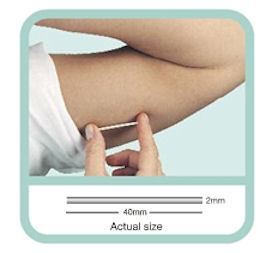Implanon contraception failures cost NHS £200,000
The NHS has paid out nearly £200,000 in compensation to women who have become pregnant or been injured by a contraceptive implant that is growing in popularity, Channel 4 News reveals.
More than a thousand complaints about Implanon have been received by the medicines watchdog at a time when the device is being hailed as the future of family planning.
Figures obtained by Channel 4 News reveal that 584 women who had the hormone-filled tube inserted into their arms have reported unwanted pregnancies to the Medicines and Healthcare Regulatory Agency (MHRA).
This is not what I want. I put this thing in to protect myself… I don’t want kids at this time. Lara
There have been a total of 1607 complaints to the MHRA about scarring and other problems associated with the device. In the most serious cases, NHS Trusts have been forced to offer settlements to seven women totalling nearly £200,000.
Some women who took Implanon after deciding they did not want more children have had to terminated pregnancies and suffered the breakdown of their relationships.
Lara, from south London, descibed the moment four years ago she discovered she was pregnant because her implant was incorrectly fitted.

She said: “I feel very very disturbed – hitting the head on the table.
“Crying, weeping again. Weeping like a young child. It really disturbed me. I wasn’t happy, not feeling well. Your mind is disturbed…. my mind was so disturbed – thinking why is this happening to me?”
Lara’s marriage collapsed and she suffered nightmares for months after having a termination.
“This is not what I want. I put this thing in to protect myself so I can continue with my studies. I don’t want kids at this time. It really disturbed me.”
Statement from Implanon manufacturer MSD:
Nexplanon will replace the currently available contraceptive implant Implanon.
The active ingredient remains the same as Implanon but the new implant is identifiable through additional localisation methods: X-ray and CT scan.
The applicator has been modified for easy insertion.
The implant is fitted by a trained healthcare professional and a training programme to re-train existing Implanon fitters or future fitters is available.
Implanon should prevent women becoming pregnant for up to three years after the £90 device is fitted into the arm by slowly releasing similar chemicals to those in the pill.
Family planning clinics in England report contraceptive implants are soaring in popularity from 16,000 women in 2005 to nearly 82,000 in 2010.
It is particularly popular amongst teenagers with 10 per cent of 16-19-year-olds saying they prefer an implant largely because they do not have to remember to take a pill. But the majority of complaints about Inplanon have been made by doctors and nurses who claim it’s difficult to insert properly and cannot be checked afterwards.
Under pressure from the MHRA, its manufacturer, MSD, has launched an upgrade called Nexplanon but the original implant will remain on the market until stocks run out.
A spokesman for MHRA said: “The reports we received from healthcare professionals and consumers played a strong role in the update of the device.”
-
Latest news
-
As India goes to the polls in the world’s largest election – what do British-Indians think?6m

-
Tees Valley: Meet the candidates in one of the biggest contests coming up in May’s local elections4m

-
Keir Starmer says public sector reform will be a struggle7m

-
Nicola Sturgeon’s husband Peter Murrell charged with embezzlement of funds from SNP1m

-
Ukraine might finally get $60billion in American weapons and assistance to defend against Russia3m

-




